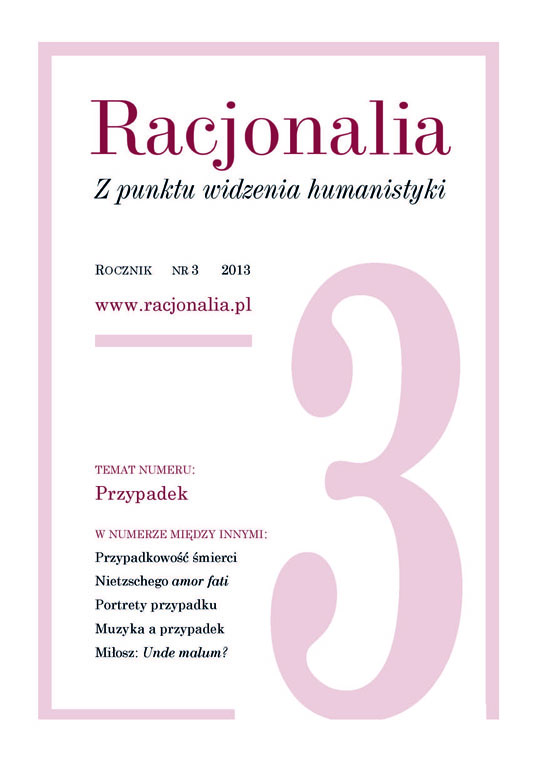Czesław Miłosz wobec pytania unde malum?
DOI:
https://doi.org/10.15633/r.269Słowa kluczowe:
evil, God, nature, suffering, unde malum?, Miłosz C.Abstrakt
The evolution of his views on the world of nature led Miłosz to spiritual transformation, which connected awereness the pain of existence with largeness and beauty of the universe. Conscious, that behind the colour of nature curtain take place continuous performance of tortures and sufferings, he treated haiku of japanese poet as his own, which he was asked to translate: „we walk above hell, gazing at flowers”. One more antidote on coping with awareness of evil, which exists in nature was warning, that human measures should not be used in assessment of world of plants and animals. Present in Miłosz world view conviction about beautiful world and permeated with evil caused, that Nobel prize winner tried to strengthen life with all his works. The author of Orpheus and Eurydice in disguise of mythical god passed on implicite, certain characteristic feature of his own creative power. Namely, the poet always stays on the side of existence, tries to see the happiness of life in surrounding tastes, smells, pictures. Opportunity to polemics, which refer to evil, which exists in our world was meeting organized 29.09.1994 by foundation ,,Sign” in which took participation inter alia Czesław Miłosz. During one of this meetings, participants of discussion agreed, that philosophy is helpless in relation to the problem of evil. Touch of evil is or absurdity or secrecy. The secrecy, which bothered Miłosz through all his life, and in front of which he stood helpless.Pobrania
Opublikowane
2013-11-30
Numer
Dział
Artykuły
Licencja
Twórca oświadcza, że służą mu prawa autorskie do utworu i że nie są ograniczone w zakresie objętym niniejszym oświadczeniem oraz że utwór jest dziełem oryginalnym i nie narusza praw autorskich innych osób.
Twórca zezwala Uniwersytetowi Papieskiemu Jana Pawła II w Krakowie na nieodpłatne, niewyłączne i nieograniczone w czasie korzystanie z utworu, to jest:
- utrwalanie i zwielokrotnianie: wytwarzanie egzemplarzy utworu techniką drukarską, reprograficzną, zapisu magnetycznego oraz techniką cyfrową;
- obrotu oryginałem albo egzemplarzami, na których utwór utrwalono (wprowadzanie do obrotu, użyczenie lub najem oryginału albo egzemplarzy, publiczne wystawienie, wyświetlenie, a także publiczne udostępnianie utworu w taki sposób, aby każdy mógł mieć do niego dostęp w miejscu i w czasie przez siebie wybranym);
- włączenie utworu w skład utworu zbiorowego;
- udzielanie przez Uniwersytet Papieski Jana Pawła II w Krakowie sublicencji Creative Commons Uznanie autorstwa-Użycie niekomercyjne-Bez utworów zależnych 3.0 Polska
Uniwersytet Papieski Jana Pawła II w Krakowie udostępnia utwór na Platformie Czasopism należącej do uczelni, na licencji Creative Commons Uznanie autorstwa-Użycie niekomercyjne-Bez utworów zależnych 3.0 Polska. Tym samym uprawnia wszystkich zainteresowanych do korzystania z utworu pod następującymi warunkami:
- zostanie podany autor i tytuł utworu,
- zostanie podane miejsce publikacji (tytuł czasopisma i adres internetowy do oryginalnie opublikowanego utworu),
- utwór będzie dystrybuowany w sposób niekomercyjny,
- nie będą tworzone utwory zależne.

